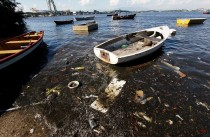 Last August, over 300 sailors from 52 countries converged on Rio’s Guanabara Bay for a pre-Olympic Games regatta designed to test the readiness of the city.
Last August, over 300 sailors from 52 countries converged on Rio’s Guanabara Bay for a pre-Olympic Games regatta designed to test the readiness of the city.
It didn’t go well.
Sailors were confronted by a ghastly mess of domestic waste, sewage, dead rats and fish and used condoms.
One prominent sailor, Erik Hail of Germany, became ill and required hospital treatment for multiple infections on his legs and hip after contracting a bacteria that carved a chunk out of his calf.
Last year the Associated Press independently tested the water in Rio, and found it to be rife with “viruses that are known to cause respiratory and digestive illnesses, including explosive diarrhoea and vomiting, but can also lead to more serious heart, brain and other diseases.”
Just last week, a severed arm was found floating in the fetid waters near the Olympic sailing venue.
Simply staying in your yacht without falling out and being nuked by filthy water will be medal-worthy in itself.
The portents don’t look good with the Games now less than six months away.
In what has become an almost weekly update on Rio’s struggle to get ready, news this week that a rail extension linking key venues to the city may not be completed in time hardly came as a surprise.
Foreign tourists are expected to arrive in their hundreds of thousands, but with traffic already a major inconvenience, visitors to the Olympic Park in Barra de Tijuca may struggle to make their way. Local officials are frantic.
As ever with such major events, the problems seem to compound. If operational and logistical challenges are almost always to be expected, viruses are not. But the Zika virus has taken hold in South America, causing alarm in Olympic communities around the world. Many athletes have expressed doubt about travelling.
Undeterred, Brazilian officials have embarked on a marketing campaign. “A mosquito is not stronger than a whole country,” reads the tagline somewhat hopefully.
Earlier this month, Sascoc, the SA Olympic Committee, sought to dampen the concerns.
SA athletes were advised to wear long-sleeved clothing, apply an insect repellent to exposed skin, sleep under mosquito-proof bed nets treated with an approved insecticide, spray the inside of their rooms with an insecticide after closing doors and windows and to stay and sleep in screened-in or air-conditioned rooms.
Far from being an adventure, Rio doesn’t sound like a whole lot of fun, does it?
Not surprisingly, the International Olympic Committee hasn’t considered changing a thing. Damn the torpedoes, full speed ahead.
If Rio seems like a Latin version of happy chaos, this isn’t an unsuitable label.
Many venues are not yet complete, including those for athletics, swimming, cycling and the international media centre. As we’ve seen with the Commonwealth Games and even the Winter Olympics in Russia, we may have to get used to the sight of workers hammering away on the very morning of the start of the Games on August 5.
With Brazil in the middle of its worst recession in 20 years, there are also fears that ticket sales are not as vibrant as hoped for.
It has also emerged that spectators will not be allocated specific seats for many events, including archery, badminton, boxing, equestrian, hockey, rowing, rugby sevens, shooting, table tennis and weightlifting.
Organisers consider this policy more “flexible”, but suspicions remain that it could lead to crowd trouble.
Given all these issues, the over-riding thought is how onerous and cumbersome the modern Olympic Games have become. Countries willingly get into debt up to their eyeballs and the return, far from being positive, is seldom worth the investment.
The trouble is that city fathers treat the Olympics and other mega-events like vanity projects. It’s a time to show off and glad-hand, no matter that most cities cannot afford to spend such staggering amounts.
We discovered as much when South Africa hosted the 2010 World Cup with a number of stadiums reduced to white elephants. The much-touted legacy of 2010 is a mirage, little more. But the politicians were pleased and we had a big party.
For Rio, hosting the Olympics on the back of a soccer World Cup, it’s a double whammy.
As they are discovering to their cost, it’s a lark that isn’t nearly worth the trouble. Or the money. – © Sunday Tribune
